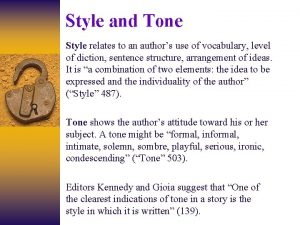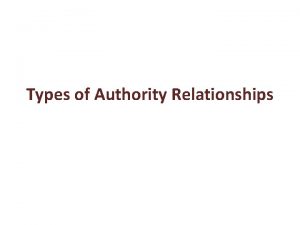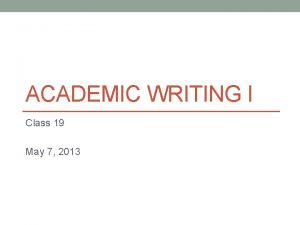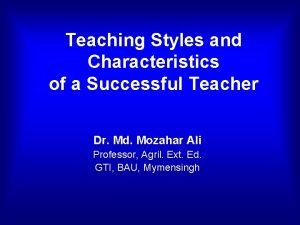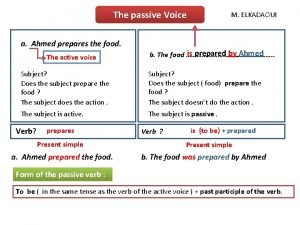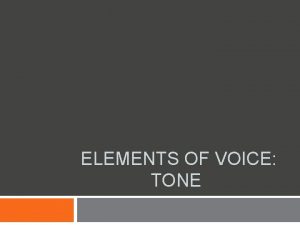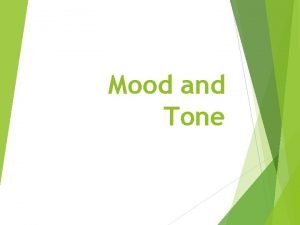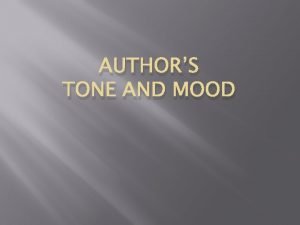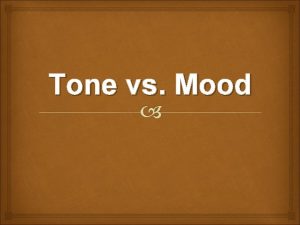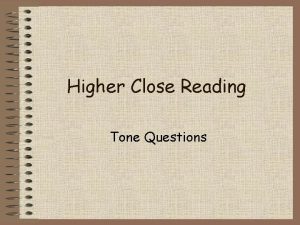Academic Writing Style Tone Voice Authority and Academic














- Slides: 14

Academic Writing Style Tone, Voice, Authority, and Academic Conventions

When you start using sources for writing, sometimes your own voice gets lost in a sea of quotes and paraphrases, and that’s not good. You need a strong writing voice of your own to pull your information together and to form a cohesive argument. At the same time, you need to make sure you adhere to academic conventions for tone and style. As an academic writer, you need to find your academic voice, which means the more formal and polished version of your normal writing voice. Academic Voice

What is a writing voice? Voice in writing essentially refers to the expression of a writer’s personality on the page. That can mean different things in different contexts, though. It’s really a combination of personality, mood, and tone. When you speak, you select a tone appropriate to the context. You don’t speak to your elderly aunt at her husband’s funeral in the same tone you use with your best friend at her birthday dinner. You project a different voice and a different aspect of your personality depending on the context. Academic writing requires the same process. Let your own personality show but do so with the appropriate tone and energy for the situation. Research papers are not exactly funerals, but they are formal events. They are the equivalent of standing up in front of a crowd to deliver a professional speech. You want your audience to be engaged, but you also want to be respectful of the level of seriousness in the occasion. When you learn to find that balance, you start to develop your academic voice.

Conventions of Formal Writing Write in third person Avoid contractions and abbreviations Use present tense when quoting or paraphrasing a source Use active verbs Avoid colloquial expressions and slang Refer to people by their last names after first introducing their whole name Write complete sentences (no fragments for effect) Use concise language Vary sentence structure and word choice Balance analysis and information

Leaving out the I Formal academic writing is not about “I. ” Personal narrative essays do use first person, but more formal academic essays like research papers and technical reports do not. When you write personal narratives, it’s okay so say “I” because the paper is about you. When you write research papers, the paper is about the topic. It has nothing to do with you. Personal anecdotes and examples don’t belong in research papers. Likewise, using phrases like “I think” are also discouraged because for one this isn’t supposed to be personal, and for another saying “I think” can undermine the authority of the information. Just build up your information and let it make its own case.

When you and yours are not okay In academic writing, second person (you) is typically reserved for writing instructions. Sometimes, in sparing amounts if the teacher is okay with it, “you” might be used in personal narratives. In research papers, “you” should only appear if it is inside a quote. One of the problems with second person is that the meaning is often unclear. Is “you” the reader of the essay? Is “you” a vague generalization for everyone? In instructions, it is clearer that “you” means the reader. In research writing, it is better to avoid the ambiguity. Avoid ”you” can be important to helping define the audience. If the essay is about the impact of required meal plans on college students, most likely the “you” that is being targeted is an audience of college students. It’s far better to say “college students often complain” than to say “you often complain. ” When the audience is clearly defined, the essay is much stronger.

Using last names to refer to authors, public figures, and anyone else cited in a formal essay is an academic convention. The first time you refer to an author, introduce the person with his or her full name. After that, use the last name only unless you have two authors with the same last name. Example: Hurston indicates that…. If you are talking about Zora Neale Hurston, you are not talking about a friend. You have not been granted permission to be on a first name basis in your writing. The first time you introduce her, say Zora Neale Hurston. After that, you can just call her Hurston. Doing this is a way of showing respect. Using last names

01 02 03 When summing up things that happened in real life in the literal past, use the past tense. When discussing your own findings and conclusions, use the past tense unless present or future tense makes more sense in context. When talking about the points made in a particular article, study, book, video, or other source, use the present tense. Working with verb tense

Active Verbs Good academic writing requires strong and concise sentences, and that requires active verbs. Active means the subject is doing the action of the sentence, not having it done to them. Example Passive Voice: A recent study on flu vaccinations was conducted by the Harvard School of Public Health. Active Voice: The Harvard School of Public Health recently conducted a study on flu vaccinations. Active voice makes for stronger sentences, and stronger sentences create a stronger essay overall.

Variety in word choice and sentence structure is a mark of strong writing. When working with sources for research papers, it can be particularly important to strive for variety. Otherwise, you will end up with a paper in which you use the word “says” about 100 times. Instead of ”says, ” try indicates, implies, predicts, demonstrates, argues, examines, or any number of other possible lead in verbs. Variety Also, try varying the length and structure of sentences. This can help to move the essay along and prevent a sense of monotony. Short sentences can be powerful. They can be even more powerful when followed by longer sentences that expand upon their meaning and offer structural variety to the paragraph.

It’s easy to lose your own voice in an essay loaded down with information. Likewise, it is easy to lose the sense of purpose for the essay if every paragraph is basically a collection of facts from various sources. That’s why good writers engage with their sources. Good writers respond to and analyze the information provided. Find your balance between information and analysis, and you will write a much stronger essay. Balancing Analysis and Information

When you write personal narratives, your authority on the topic comes from having lived through it. You might be an authority on a certain musician by virtue of having listened to this person’s work on repeat for years. You might be an authority on being a middle child or being lefthanded or keeping cats as pets. You know a lot from experience that you can talk about. When you write research papers, though, your authority on the topic comes from the knowledge you’ve gained through reading. Thus, it’s vital to read enough to really absorb the topic, and it is crucial to pick good sources. Your authority is only as strong as your knowledge, and your knowledge is only as strong as your sources. Read thoroughly. Cite facts from strong and reliable sources. Write with confidence when explaining and analyzing the meaning of your source information. That’s how you establish authority in research writing. Establishing Authority

To bring these various academic conventions together effectively, you need a strong writing voice. We’ve already discussed the idea that your writing voice is a formalized projection of your personality on the page. To do this, practice the following strategies. Understand your topic well enough to speak with confidence on it. Projecting Voice Use strong sentences and strong verbs. Use a college level vocabulary without venturing into words you aren’t comfortable using appropriately in conversation. Be aware of the tone and the energy level you want to infuse into your writing at all time. Imagine that you are making a career making speech, and you need the most impressive version of yourself to be heard.

Practice makes perfect Like any skill, strong academic writing requires practice. You wouldn’t try to run a marathon without practicing, and if you think can learn to play the piano without practicing, you are sadly mistaken. Academic writing as a skill set develops over time, and it develops in each individual writing assignment as a process. You learn a single piece of music by practicing over and over. You learn a dance move by practicing over and over. You perfect an essay by making a lot of mistakes and correcting them in multiple revisions. If you want to do your best in an essay, start early, work on it some every day, and keep going back over it to apply the advice you’ve been given here and elsewhere to the best of your ability. You’ve got this. Now jump in there and get it done.
 Style vs tone
Style vs tone Contracted forms
Contracted forms Similarities of academic writing and technical writing
Similarities of academic writing and technical writing Authority relationships
Authority relationships Business writing vs academic writing
Business writing vs academic writing Intonation
Intonation Authority style of teaching
Authority style of teaching What is the pattern of active voice
What is the pattern of active voice Passive voice formula chart
Passive voice formula chart Passive froms
Passive froms Film tone and style
Film tone and style Is descriptive a tone
Is descriptive a tone Analysis style and tone
Analysis style and tone Style examples
Style examples Style and tone examples
Style and tone examples
